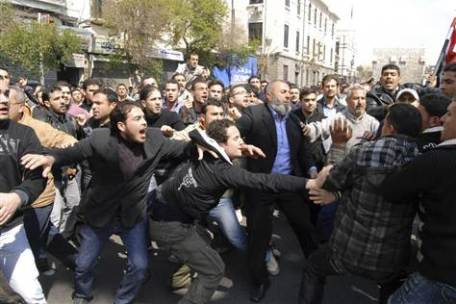Behind Qatar’s anti-Syrian Policy

These days, Qatar is striving to play a key role in assisting the opponents of Bashar al-Assad to overthrow the Syrian government, leaving no opportunity missed. The Qatari Emir (in his interview with BBC) has proposed that the Arab countries dispatch their ground forces to Syria in order to halt the massacre and bloodshed, a strategy that, as Qasem Mohebi puts it: “is a new solution after the failure of the Arab Leagues’ observers’ mission to Syria.”
IRD: How do you explain Qatar’s position towards the Syrian crisis?
QM: Part of this is because of Qatar’s rotating presidency of the Arab League Ministerial Committee, so inevitably it deals with Syrian crisis more than any other Arab countries. But the second cause is Qatar’s self-defined in the latest upheavals in the Middle East known as the Arab Spring. The Arab Street’s uprising against their governments is supported by Al Jazeera or political channels such as the Arab League. Qatar is seeking a foothold in every tumultuous country, more in Libya and Egypt, less in Bahrain and Saudi Arabia; and again more in Syria.
It is not strange that it acts more freely vis-à-vis Syria, since Doha is supported by Saudi Arabia, while in the case of Yemen or Egypt, there was no such support. Saudis’ interests in Syria are so crucial that have instigated their support, while in general, Riyadh has frowned upon popular movements in the region. With Alewites framed as part of the Shi’a community, Riyadh has defined the battle in Syria as part of the larger Sunni-Shi’a framework. Syria’s strong links with Iran and its influence on Lebanese politics also give Saudi Arabia strong motives to meddle in the country.
IRD: But why is Qatar advocating military intervention? This is the first time an Arab country suggests that involvement of an Arab joint force in a member state. Can this be interpreted as a change in the nature of the Arab League’s activities?
QM: That is true. But don’t forget that the role of Qatar is not that decisive in the Arab League. Even the league appears to be incapable of launching such an operation. Unless the UN Security Council throws its weight behind the plan, the Arab League itself cannot take such a measure. We saw that there was no consensus and no capacity, but disunity, among members of the organization when dispatching human rights’ observers to Syria. Military intervention will just aggravate things.
IRD: Hypothesizing regional or international military involvement in Syria, what parties will be the key beneficiaries?
QM: Syria’s case has entered a new phase: there’s a deadlock and the country is on the brink of a civil war. We are seeing a significant portion of the Sunni majority that has turned against both the Alewite government and the Alewite minority. The problem here is that neither can the government sweep aside the protest, nor can the opposition overthrow the government. Prolongation of this war of attrition could encourage foreign intervention in the long-term, either in a diplomatic or military form. The Arab League has not achieved any success so far, so the next move may come via the Security Council, the EU or NATO, all of which benefit Saudi Arabia and its allies, the West and Israel and harm the interests of Russia and China.

